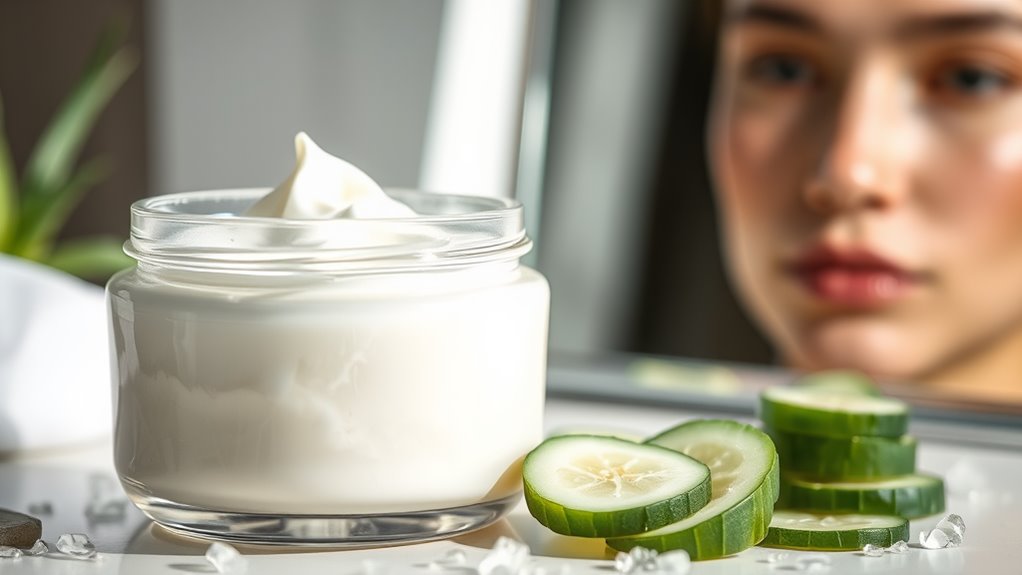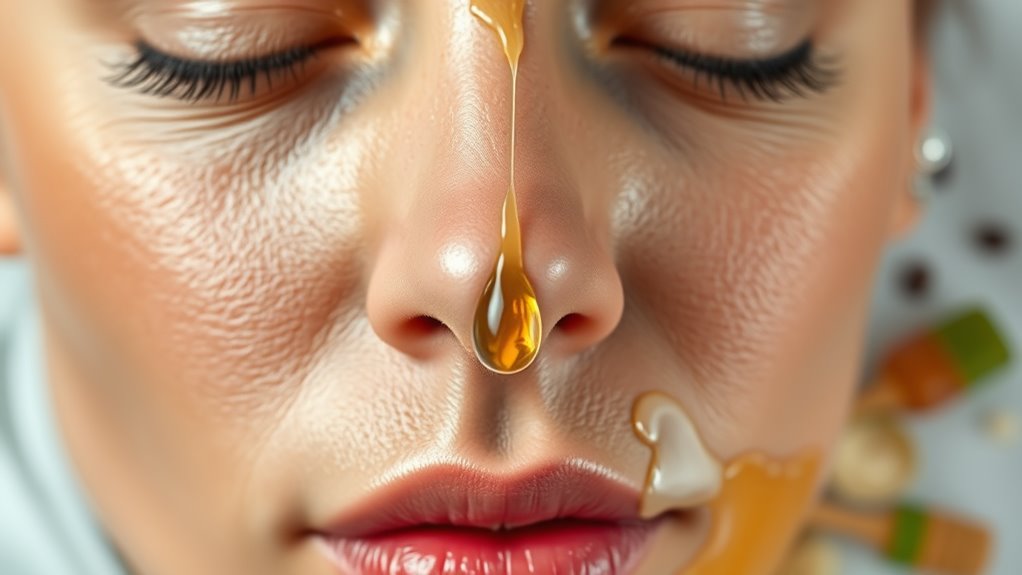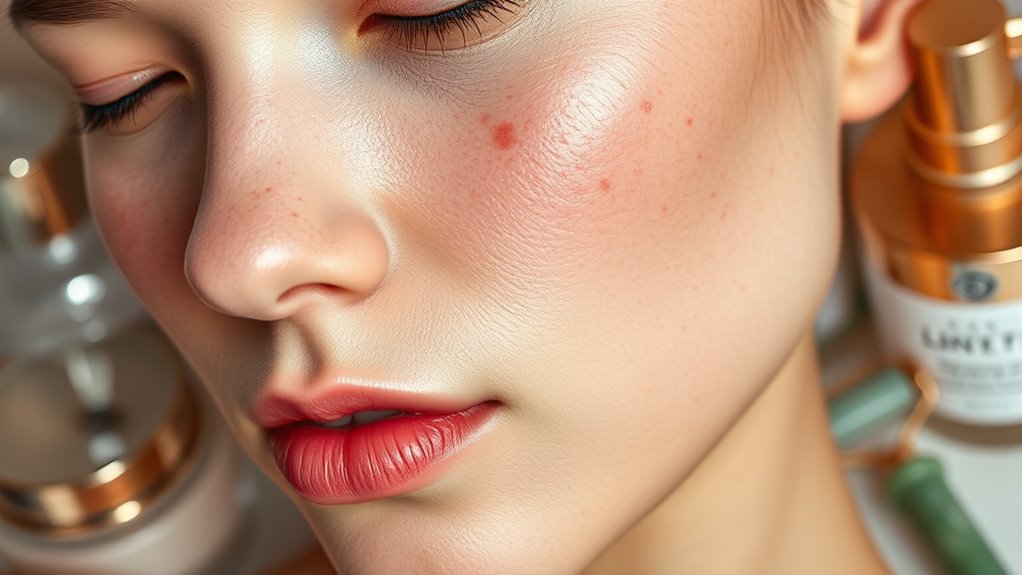Is Your Moisturizer Too Heavy. Signs You Need a Lighter Formula
If your moisturizer feels greasy, leaves a shiny residue, or you notice increased breakouts, it might be too heavy. You should also be wary if your skin feels tight or dry shortly after application. Heavy formulas can clog pores and disrupt your skin’s barrier, leading to irritation and discomfort. Switching to a lighter moisturizer can enhance hydration and balance. Curious about how to choose the right lightweight formula? There’s more valuable information ahead.
Key Takeaways
- If your skin looks greasy or shiny shortly after application, your moisturizer may be too heavy.
- Experience clogged pores or increased breakouts? This could indicate a need for a lighter formula.
- A feeling of heaviness or discomfort suggests your moisturizer isn’t suitable for your skin type.
- If your skin feels tight or dry hours after moisturizing, consider switching to a lighter product.
- A lack of hydration despite using a moisturizer may mean it’s too heavy to absorb effectively.
Understanding Your Skin Type
How well do you know your skin type? Understanding your skin type is crucial for choosing a moisturizer that meets your specific needs.
Generally, skin types fall into four categories: oily, dry, combination, and sensitive. Each type responds differently to moisture. Oily skin often requires lightweight, non-comedogenic formulas to avoid clogging pores, while dry skin benefits from richer, more emollient products.
Combination skin needs a balanced approach, targeting drier areas without overwhelming oilier zones. Sensitive skin typically requires hypoallergenic options to minimize irritation. Additionally, choosing the right cleanser for your skin type can significantly enhance the effectiveness of your moisturizer.
Signs of a Heavy Moisturizer
Once you’ve identified your skin type, it becomes easier to recognize when a moisturizer might be too heavy for your needs.
Common signs include a greasy or shiny appearance shortly after application, indicating excess oil on the skin’s surface. If you notice clogged pores or an increase in breakouts, your moisturizer may be occlusive, trapping impurities.
You might also experience a feeling of heaviness or discomfort, as if the product is sitting on your skin rather than absorbing. Additionally, if your skin feels tight or dry hours after moisturizing, it suggests that the formula isn’t delivering adequate hydration. Choosing a lighter formula can significantly improve your skin’s overall health and appearance.
Effects of Using a Heavy Formula
Using a heavy moisturizer can lead to several adverse effects on your skin, particularly if it doesn’t match your skin type.
When you apply a formula that’s too rich, you may experience clogged pores, resulting in breakouts or acne flare-ups. Excess oiliness can also occur, creating a shiny complexion that feels uncomfortable.
Additionally, heavy moisturizers can disrupt your skin’s natural barrier, causing irritation or redness. You might notice an increase in sensitivity as your skin struggles to breathe beneath a thick layer.
Over time, this can lead to compromised skin health, diminishing your overall radiance. Understanding these effects is crucial; selecting a moisturizer tailored to your skin type is essential for maintaining optimal skin function and appearance. Hydration is vital for oily skin as it helps maintain balance without adding excess oil.
Benefits of Switching to a Lighter Moisturizer
Switching to a lighter moisturizer can significantly enhance your skin’s absorption of active ingredients, allowing for better hydration and nourishment.
Additionally, using a lighter formula often reduces the risk of breakouts, making it a suitable choice for acne-prone skin.
With these benefits, your skin can achieve a healthier balance and a smoother appearance. Furthermore, opting for lighter moisturizers can help alleviate sensitive skin symptoms, leading to a more comfortable and radiant complexion.
Enhanced Skin Absorption
When your skin feels heavy or congested, opting for a lighter moisturizer can significantly enhance absorption. Lighter formulas typically contain smaller molecules, allowing them to penetrate the skin more effectively.
This improved absorption means that active ingredients, such as hyaluronic acid or antioxidants, can more readily reach deeper layers of your skin, maximizing their efficacy. Additionally, a lighter moisturizer provides hydration without overwhelming your skin’s natural barrier.
This balance helps maintain optimal moisture levels while preventing the occlusion that can arise from heavier creams. You’ll notice a more supple texture and a healthy glow as your skin effectively utilizes the beneficial ingredients.
Ultimately, switching to a lighter moisturizer can transform your skincare routine and elevate your skin’s overall health.
Reduced Breakout Risk
A lighter moisturizer not only enhances skin absorption but also reduces the risk of breakouts.
When you switch to a non-comedogenic, lightweight formula, your skin can breathe more easily, preventing clogged pores. This is crucial for maintaining a clear complexion.
Here are some benefits of adopting a lighter moisturizer:
- Non-comedogenic ingredients: They won’t clog your pores.
- Reduced oiliness: Helps balance your skin’s natural oils.
- Improved hydration: Provides adequate moisture without excess heaviness.
- Enhanced skin texture: Promotes smoother, healthier skin.
- Lower inflammation: Reduces the likelihood of irritation that can lead to breakouts.
How to Choose the Right Lightweight Formula
How can you determine the best lightweight moisturizer for your skin type? Start by identifying your skin’s needs—oily, dry, or combination.
For oily skin, look for non-comedogenic formulas with a gel-like texture that absorb quickly. If you have dry skin, opt for lightweight creams containing hydrating agents like hyaluronic acid, which provide moisture without heaviness.
For combination skin, consider a moisturizer that balances hydration and oil control, ideally with a matte finish. Always check for ingredients that suit your sensitivities; fragrance-free options are often safer.
Finally, perform a patch test to observe how your skin reacts before fully incorporating a new product. This approach ensures you select a lightweight formula that supports your skin’s health effectively. Additionally, remember that using a non-comedogenic formula can significantly reduce the risk of breakouts common with oily skin.
Recommended Lighter Moisturizer Ingredients
What ingredients should you seek in a lighter moisturizer? To achieve optimal hydration without heaviness, focus on lightweight, non-comedogenic components.
Here are some key ingredients to consider:
-
Hyaluronic Acid: Attracts moisture without adding weight.
-
Glycerin: A humectant that draws water into the skin.
-
Squalane: Mimics skin’s natural oils, providing hydration without clogging pores.
-
Aloe Vera: Soothes and hydrates while being exceptionally light.
-
Niacinamide: Enhances barrier function, improves texture, and controls oil.
Incorporating these ingredients can help maintain hydration while preventing the greasy feel associated with thicker formulations.
Always ensure the product is tailored to your specific skin type for the best results.




